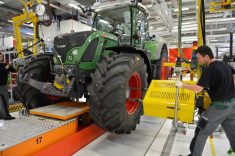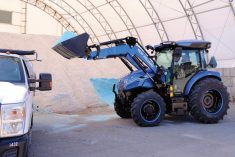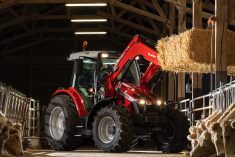Global positioning tech firm Trimble is set to sell its precision ag business into a new joint-venture company that will include farm machinery maker Agco’s made-in-Manitoba autonomy arm.
From farmers’ perspective, the two companies say their combined technology offering is expected to offer “seamless integration and connectivity across geographies, equipment brands and the crop life cycle.”
The structure of the deal announced Thursday will see Trimble receive $2 billion cash and a 15 per cent share in the new joint venture, for total pre-tax value of about $3 billion accrued to that company (all figures US$).
Read Also

More Canadian companies at Agritechnica 2025
A record number of Canadian agriculture machinery and tech companies are at Agritechnica 2025, with exporters being more aggresive looking for new markets.
Agco, whose machinery brands include Massey Ferguson, Fendt, Challenger and Valtra, contributes its JCA Technologies business to the new j.v. and will hold the 85 per cent majority stake in the venture.
The deal is expected to close in the first half of 2024, pending the usual approvals and other closing conditions.
The new j.v. won’t include Trimble’s Global Navigation Satellite System (GNSS) or guidance tech, but Trimble will provide those to the new venture under a new long-term supply agreement and technology transfer and license agreement — along with an agreement making the new venture a “channel partner” of Trimble’s positioning services in the ag market.
Winnipeg-based JCA, which Agco bought last year, makes systems and software including the Vireo precision ag system, the Eagle autonomous equipment system and the Falcon and Oriole controller systems.
JCA also developed the control system supporting the Canadian-made DOT autonomous ag equipment platform, now owned by Agco’s OEM rival CNH Industrial.

Trimble and Agco said the new venture is meant to “better serve farmers with factory-fit and aftermarket applications in the mixed fleet precision agriculture market” and to be “a global leader in mixed-fleet smart farming and autonomy solutions.”
The deal “accelerates Agco’s growth ambitions around autonomy, precision spraying, connected farming, data management and sustainability,” Agco CEO Eric Hansotia said in a release.
It also “significantly enhances Agco’s technology stack with disruptive technologies that cover every aspect of the crop cycle, which ultimately helps us better serve farmers no matter what brand they use,” he said.
“We believe a joint venture with Agco, complemented by the successful mixed fleet approach that they have developed with their Precision Planting business model, can help us better serve farmers and OEMs (original equipment manufacturers) together,” Trimble CEO Rob Painter said.
From Trimble’s perspective, the deal streamlines its asset portfolio and allows it to increase its focus on “priority growth areas” — while reducing its direct exposure to the “hardware-centric” ag market but still maintaining its “ongoing participation in a leading precision ag asset.”
The “commercial synergies” the new joint venture will get from direct access to Agco’s OEM, aftermarket, other OEM and retrofit channels — along with “modest” run-rate cost synergies — are expected to roughly double the new venture’s earnings before interest, taxes, depreciation and amortization (EBITDA) by year five after the deal closes, Agco said.
GSI under review
In its release Thursday announcing the new joint venture, Agco also said it has placed its “grain and protein” business segment under “strategic review.”
That business segment includes Agco’s grain handling systems brand GSI, as well as grain processing equipment brand Cimbria and three livestock housing systems brands: Cumberland, AP and Tecno.
While Agco didn’t give any examples of the options it’s considering for those businesses, it said it will “assess all strategic options to ensure the Grain and Protein customers are serviced in the best way possible, and that the business is best positioned to maximize its full potential.” — Glacier FarmMedia Network















